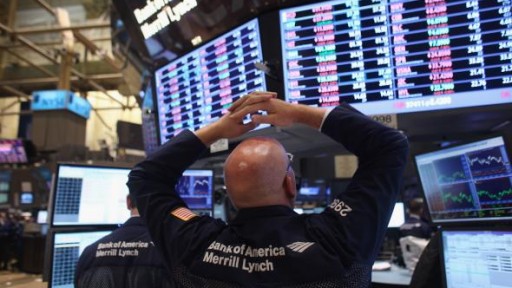- Home
- >
- Market Rumours
- >
- Why stock investors should stop worrying and learn to love falling oil

Why stock investors should stop worrying and learn to love falling oil

Falling oil prices have been blamed for a recent weakness in stocks, but the high degree of correlation between the two asset classes is actually weakening toward their historical levels. Meaning that oil and stock values are likely to start moving independently.
That appears to be a “silver lining” for stock investors, according to Nicholas Colas, chief market strategist at Convergex. Going back to 1973, the long-term correlation between stock prices and oil prices is almost zero, or negative 1.1%.
That means, on average, for more than 40 years, oil prices and stock prices have moved independent of each other. The problem is, that average is arrived at by wide swings, so there have been distinct periods where stocks and oil prices have moved in tandem or in opposite directions.
Curiously enough, the high degree of correlation between the S&P 500 Index SPX, +1.16% and oil skyrocketed right around the time crude settled at its record high price $145.29 a barrel on the New York Mercantile Exchange back in July 2008. Crude oil for February delivery CLG5, +0.70% settled at $47.93 a barrel Tuesday, its lowest settlement since April 2009.
The two asset classes hit their highest degree of moving in sync since the 1970s in August 2012 , when correlation reached 49%. Since then, they’ve steadily been exerting less influence on each other.
“The missing link to all this is, of course, oil’s role in the world’s economic growth,” Colas noted. “Consumption from the world’s emerging markets explains the post-2004 levitation, accompanied by a weaker dollar that made crude more affordable to non-greenback based buyers. Offsetting that growth – but not price (entirely, anyway) – was increasing U.S. production plus other non-OPEC sources. It is this link to economic growth that has financial markets in a tizzy over the last few weeks.”
In other words, it’s not just falling oil prices unsettling investors, but fears that oil’s collapse is symptomatic of a rapid slowing of global economic growth, and that could be bad for stocks all around.
Fallout in the U.S. will likely come from a loss in high-paying energy sector jobs, Colas admits, but the likelihood is those losses will be offset by jobs created from higher consumer spending because of money saved from lower energy costs.
The problem is, job losses may occur before new jobs are created. “One thing is sure: we’ll see the bad long before we see the good,” Colas noted.
 Varchev Traders
Varchev Traders If you think, we can improve that section,
please comment. Your oppinion is imortant for us.






